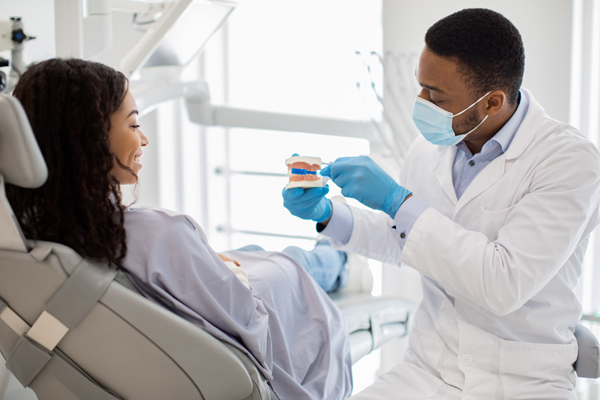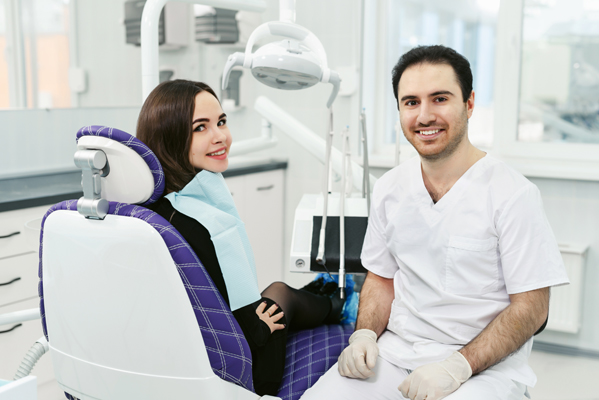Are My Bleeding Gums a Sign of Gum Disease?

Most people don't give a second thought to gum disease. However, while brushing your teeth, maybe you noticed a slightly pink tinge when you spat out. You also discovered some bleeding while flossing. Although minor bleeding may not seem like a severe problem, recurrent gum bleeding is a condition you should never ignore. Bleeding gums is a result of several factors, including gingivitis and pregnancy. Altering your oral care regimen can also cause gum bleeding initially.
How gum disease causes bleeding gums
If you do not maintain good oral care routines such as regular brushing and flossing, you give food debris a chance to bind with bacterial plaque and accumulate in your teeth grooves. The plaque is sometimes visible as a white or yellowish film on the gums. As the bacteria accumulate and grow, they cause gum irritation, leading to gingivitis. Gingivitis is the first stage of gum disease, and the typical symptom is bleeding gums. Other signs of gingivitis include sensitive gums, bad breath and red gums.
If you fail to treat gingivitis, it will worsen to the point where the gums may start pulling back from the teeth, creating pockets that allow bacteria to accumulate and penetrate the teeth. As more bacteria infect the tissues, your oral health degenerates considerably into periodontitis. Fortunately, the early stage of gum disease is reversible. The dentist can clean away the plaque and bacteria deposits from your teeth. The following are ways to prevent bleeding gums:
Preventing gum disease and bleeding gums
Improve your oral hygiene
As mentioned earlier, the most popular cause of bleeding gums is plaque accumulation on the gumline. Failure to clean the plaque immediately will allow it to harden into tartar. The best way to stop plaque in its tracks is to improve your oral care regimen.
Make sure you brush your teeth at least twice daily using a fluoride toothpaste. Floss daily, and ensure you visit your dentist regularly, not just when there is an issue.
Check your dental tools
If your oral hygiene is optimal and you still go for your biannual dental appointments, then your oral care tools may be responsible for making your gums bleed. You may feel that a toothbrush with hard or medium bristles will clean your teeth better, but they could actually be irritating your gums and causing them to bleed. According to the American Dental Association, you should use a soft-bristled toothbrush to clean your teeth to prevent irritation.
Sometimes, it may not be the tool, it could be how you are utilizing it. If you have not flossed recently, start doing it again. You might notice some blood on your gum line, but that will stop. Remember to be gentle and try not to press the floss too hard.
Visit the dentist
If improving your oral hygiene and adopting a healthier diet did not stop the bleeding gums, then you need to book an appointment with the dentist. The dental expert will evaluate your gums and teeth to know if you are dealing with advanced gum disease. If treatment is required, you may be referred to a periodontist, who is an expert at treating gum disease.
Request an appointment here: https://perfectsmilesdentalstudio.com or call Perfect Smiles Dental Studio at (661) 551-1104 for an appointment in our Santa Clarita office.
Check out what others are saying about our services on Yelp: Read our Yelp reviews.
Recent Posts
Root canals are one of the most common dental procedures dentists perform. However, there are many different types of dentists for you to choose from, making it necessary to understand if your general dentist is able to perform specific dental services, such as a root canal. General dentists are equipped to perform a root canal. In…
When a tooth develops a cavity, a tooth filling will be required to repair the tooth and restore its function and appearance. Since tooth pain is often the first sign of a cavity, it is normal for patients to be worried about what they will feel during the filling procedure. This article focuses on what…
Whether you are scheduled for a dental procedure that requires sedation dentistry or are simply interested in learning more about it before your consultation visit, understanding what sedation dentistry is and the different types that are available is helpful. In essence, sedation dentistry is a way to minimize discomfort and help the patient relax during…
Severe tooth decay or damage is often treatable through root canal therapy. Despite its reputation, undergoing a root canal is similar to filling a cavity and is generally no more uncomfortable. Learning about the procedure and the recovery process can help alleviate concerns, helping patients see the benefits of preserving their smile with a root…


